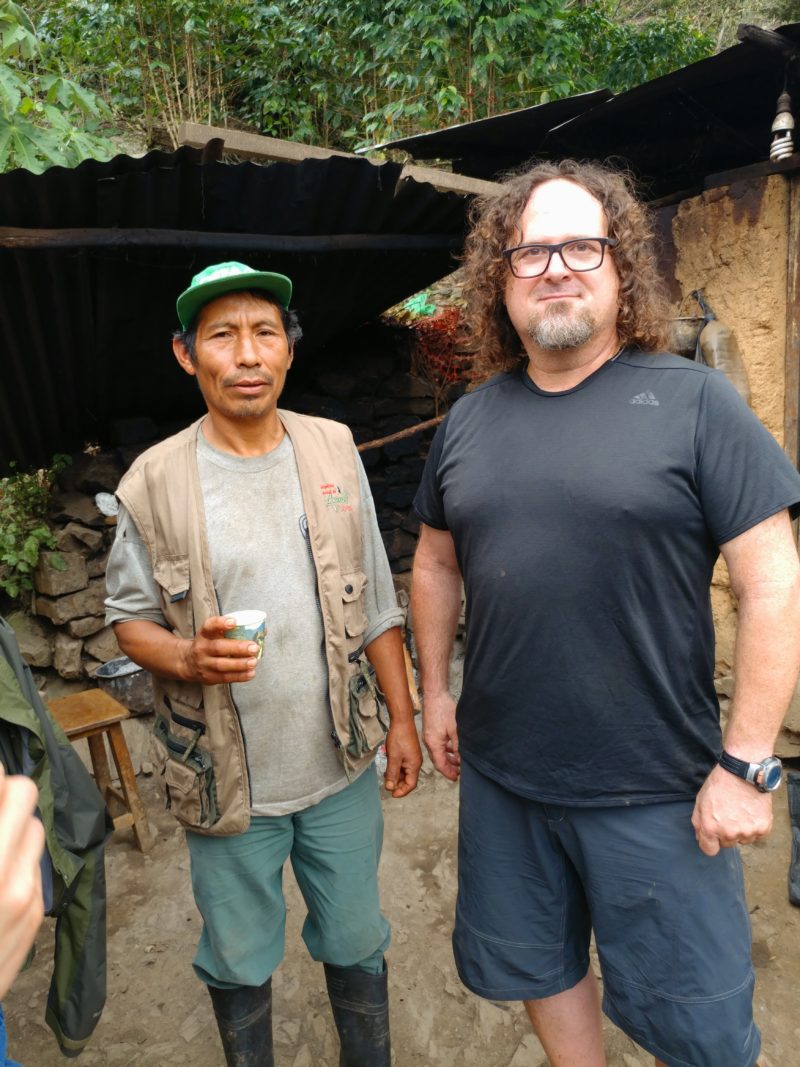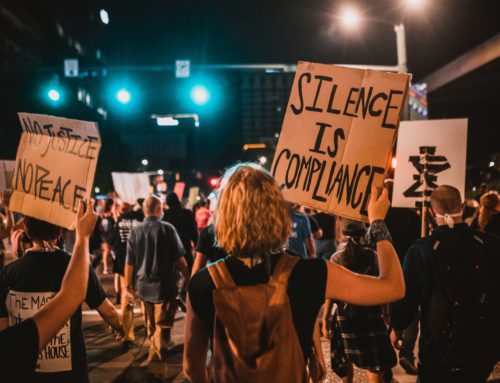**By Guest Contributer Jeff Chean, Co-Founder & Chief Coffee Guy, Groundwork Coffee Co.
The Monday night before the election, around midnight, I awoke. I heard something. It was something I hadn’t heard since late March 2020 and for a time afterward — at least until Shelter-at-Home started to unravel. The something I heard was actually… nothing. I was awoken by the absence of the sounds that usually assaults my apartment every night. Last March, the silence was because we were sheltering at home; today, while it might be a reality again soon, we’re not there yet. I walked out onto our balcony and stood there listening. Listening to… nothing.
Driving home that same Monday, I saw business owners and buildings boarding up their street-level glass windows and doors. There was a strong sense of impending…something. Not doom — that’s too dramatic — but something. Maybe. Maybe that’s why the usual bombardment of noise was missing. The shared herd sense that something big was brewing and that maybe staying inside, not being there, when it went down might be a good idea. Fear unites, but it also divides. We’ve seen the fissures that have always been on the surface and deepen and widen over the last five years.
Maybe this is where we take a cue from my coffee friends in Peru.
At 1800 meters, the air gets thin. One June a few years ago, I found myself staring admiringly out at a beautiful landscape from the hillside farm of Fundo Ankawachana (Eagle’s Nest) in Southern Peru and considering how difficult it must be to harvest the coffee from the trees on these steep slopes. Huffing and puffing up the mountainside in air thinner than I like (a bit more oxygen in my air, please, and thank you), I found the hike hard. How did the farmer harvest the several hectares of steeply planted coffee trees by himself? Coffee farmers aren’t soft city boys (like me) but still! So, I asked my translator. “Ayni”, the grower Guzman Hermanojilo responded. What’s Ayni? It’s an indigenous Ketchwa word that describes a survival strategy in a tough world and means, in essence: “Today for me; tomorrow for you” my translator explained. Ayni distills deep concepts about the importance of connection and community into a single word.
Today for me; tomorrow for you. It’s simple. It works. Neighbors, forgetting any differences they may have, come together and work for one another to ensure that they all survive and thrive. This beautiful act of communal cooperation happens every year, year-after-year, for centuries despite the fact that all the neighboring coffee farmers are, in a very real sense, competitors. Survival trumps that little conflict of interest and allows everyone to put aside any differences and pitch-in. The only compensation received is: Ayni. The promise that, after having helped their neighbors, everyone will reciprocate and help with her harvest. Ayni. Ayni has become a given, a constant in their planning. It’s as certain as the sun will rise in the East every morning. The knowledge that, come rain or shine, the neighbors are all going to step in and help each other has, over the centuries, become part of these people’s foundational identity. Ayni is a physical manifestation of the invisible lines of connection that bind that little community high up in the Peruvian Andes together. And it’s not just that community. All the communities in the mountains operate under some form of Ayni. They have to. Life is tough here, but it’s tougher alone than it is working together.
This concept is not entirely unknown in the US; however, it is more prevalent in agrarian parts of the US. We’ve all heard about barn-raisings, etc. but how many of us have ever participated in one (or some city-life equivalent)? After years of living next to your neighbors, you may only know a few of their names (or none at all). The depth of your relationship with those few may go no further than the occasional, “S’up?” or a nod of mutual recognition as you pass each other in the morning. The irony that people living in communities in the country, often separated by large distances, being “closer” than people in cities, who live on top of one another in high density can’t be ignored. Then there’s the flip-side. Communities can become insular and unwelcoming to newcomers. People will walk a well-worn grassless path cutting through an unkempt field rather than through the grass and weeds. There’s comfort in the familiar and uncertainty/fear in the unknown or new. And if there are any two words that describe the period from mid-March 2020 to the present Uncertainty and Fear win the prize.
We’ve seen this play out in events leading up to our national elections: the increase in societal division and tribalism; the pledging of allegiance to either Red or Blue (rather than Red, White, and Blue) in a manner more akin to Bloods and Crips than patriots around our flag; and, Biden’s election by a slimmer margin than initially projected. The last example especially highlights how people gravitate towards the known during unstable times even when that known quantity is responsible for the instability. The message seems to be “The Devil you know is better than the Devil you don’t” even when the known devil is sowing chaos.
This is where Ayni can come into play.
Ayni begins with the understanding that we’re stronger together than alone. To quote comedian Dave Chappelle on a post-election Saturday Night Live, “But here’s the difference between me and you: You guys hate each other for that, and I don’t hate anybody. I just hate the feeling. That’s what I fight through. That’s what I suggest you fight through. You’ve got to find a way to live your life. You’ve got to find a way to forgive each other. You’ve got to find a way to find joy in your existence in spite of that feeling. And I would add, that in finding that joy, the feelings of hate and division will fade away.
As an analogy, I love salads but don’t like garbanzo beans in them. When dining out (pre-COVID), I almost always forgot to say, “no garbanzo beans”. Most times there aren’t any garbanzos in a salad but, when there are, they are almost never mentioned in the item description. So, garbanzo beans are sneaky that way; they just suddenly appear. I can get angry at the waiter or the restaurant and demand they take the salad back. I can also choose not to eat it. I always end up picking the garbanzos out and enjoying my salad.
Wisdom can come at you from anywhere and I found this tidbit inside a fortune cookie: All personal breakthroughs begin with a change in beliefs. Maybe not the most auspicious source, but there it is — Truth in a fortune cookie. The first step back to Ayni is fostering the belief that you can effectuate change. Then we look for the best in ourselves so we can see the good in others. Let’s look at an example involving someone you’re arguing with about why Biden/Trump is the best path forward. It’s easy to want to think the other is an idiot. It’s easy to get angry with them. It’s easy to not want to have anything to do with them again. Ever. View them as a salad with garbanzo beans. There was something that brought this person into your life, whether it was a familial connection, the way you feel when you’re with them (and not discussing politics), a shared wall or property line…something… focus on that. Pick out the garbanzo beans, put them aside, and focus on all the things in the salad that you enjoy. By doing so, you’re effectively holding a separate space for the negative elements but not impacting the essential “saladness” of what’s left in your bowl.
Our ability to come together and cooperate on a large-scale is written deeply, etched even, into our DNA, postulates Dr. Yuval Harari in a recent New York Times book review of Kindred by Rebecca Wrag Sykes, and may have been the determining factor for why Sapiens thrived while Neanderthals vanished.* In fact, looking at the example of Sapiens vs. Neanderthal, we can see the inevitable outcome of tribalism: Collapse. Time and time again over history, we’ve seen great civilizations rise and eventually fall. There are myriad reasons given for why, from complexity to famine, to war. But one concept that rings true to me is espoused by Dr. Peter Turchin of the University of Connecticut. Dr. Turchin points to what he calls “social resilience — a society’s ability to cooperate and act collectively for common goals.” * In other words: Ayni. We see the loss of that big picture view, that social resilience requires of us, in the boarding up of businesses the day before Election Day. We see it in a barista’s refusal to serve long-standing cafe customers who walk in one day wearing Trump 2020 facemasks. We see it when someone drives a truck through peaceful protestors. We see it in the actions of a president who undermines our democratic process. All these examples highlight people considering the “I” or “them” rather than “we” and bathed in the immediacy of the “now” rather than the “later”.
We can change this. We need to change this. The change all begins with the realization that we are more alike, opinions aside, than we are different. We all have similar fears, concerns, and needs for security. We’re all scaling the pyramid of Maslow’s Hierarchy of Needs as best we can. And it’s after we scale the sides and reach the top — Self- Actualization — that we are rewarded with the 10,000-foot view: we are not alone. We will need to, as Dave Chappelle said, find a way to forgive each other. We are intrinsically, even quantumly, connected. We can’t hunker down in our respective blue or red bunkers, cutting out other voices and listening only to self-affirming news stories and opinions. The key to change is being able to evoke an empathic response in Other. The only way to evoke that empathy and bring about change is through a continued, if frustrating, dialog. The road back to Ayni isn’t going to be easy, but it will be worth it.
**By Guest Contributer Jeff Chean, Co-Founder & Chief Coffee Guy, Groundwork Coffee Co.
http://www.groundworkcoffee.com





Leave A Comment